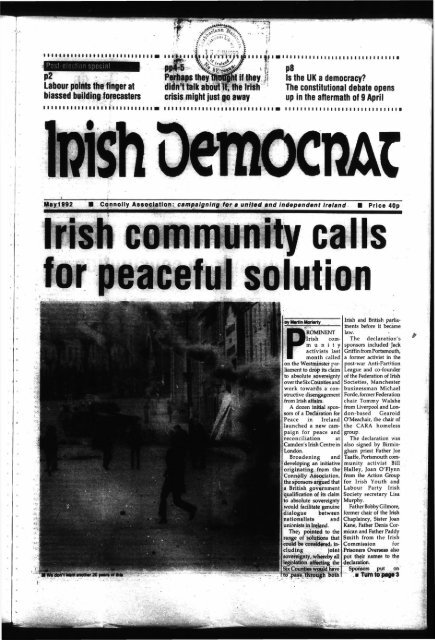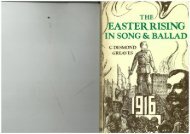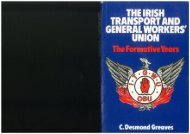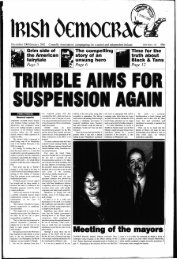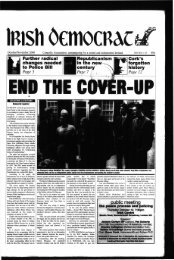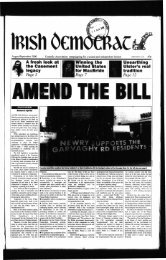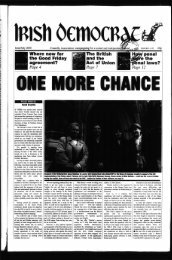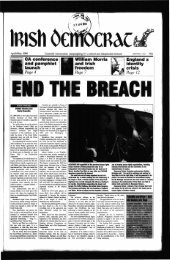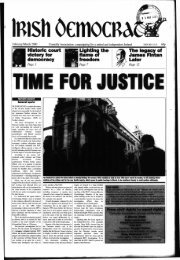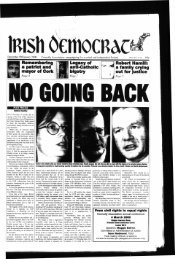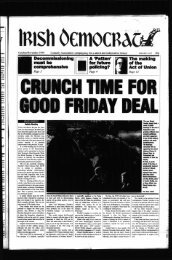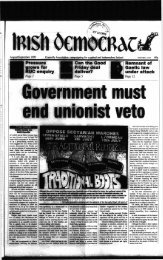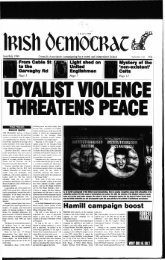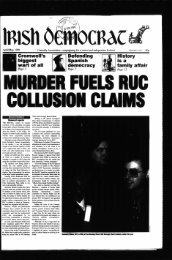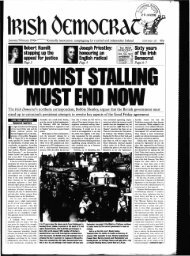You also want an ePaper? Increase the reach of your titles
YUMPU automatically turns print PDFs into web optimized ePapers that Google loves.
i M ^ I 1 1 ^ i ^ r r r ^ ^ j ^ 1111<br />
Labour points the finger at<br />
biassed building forecasters<br />
111 §111ii11111111 ii 1111111<br />
Perhapstheyfflwiptifthey j}<br />
didn't talk about if, the <strong>Irish</strong><br />
crisis might just go away<br />
1111111111111111111111111111<br />
is the UK a democracy?<br />
The constitutional debate opens<br />
up in the aftermath of 9 April<br />
111111111111111111111111111111 •<br />
Ijfty<strong>1992</strong> • Connolly Association; campaigning for a united and independent Ireland • Price 40p<br />
ahaIIiav OA imam aI *kU<br />
anoiner zu years 01 mil<br />
oy Martin Moriarty <strong>Irish</strong> and British parliaments<br />
before it became<br />
PROMINENT law.<br />
<strong>Irish</strong> comm<br />
u n i t y sponsors included Jack<br />
The declaration's<br />
activists last Griffin from Portsmouth,<br />
month called a former activist in the<br />
on the Westminster parliament<br />
to drop its claim League and co-founder<br />
post-war Anti-Partition<br />
to absolute sovereignty of the Federation of <strong>Irish</strong><br />
over the Six Counties and Societies, Manchester<br />
work towards a constructive<br />
disengagement Forde, former Federation<br />
businessman Michael<br />
from <strong>Irish</strong> affairs. chair Tommy Walshe<br />
A dozen initial sponsors<br />
of a Declaration for don-based Gearoid<br />
from Liverpool and Lon-<br />
Peace in Ireland O'Meachair, the chair of<br />
launched a new campaign<br />
for peace and<br />
the CARA homeless<br />
group.<br />
reconciliation at<br />
Camden's <strong>Irish</strong> Centre in<br />
London.<br />
Broadening and<br />
developing an initiative<br />
originating from the<br />
Connolly Association,<br />
the sponsors argued that<br />
a British government<br />
qualification of its claim<br />
to absolute sovereignty<br />
would facilitate genuine<br />
dialogue between<br />
nationalists and<br />
unionists in Ireland.<br />
The> pointed to the<br />
range of solutions that<br />
could be considered, including<br />
joint<br />
sovereignty, whereby all<br />
legislation affecting the<br />
Six Counties would have<br />
tdT pass through both<br />
The declaration was<br />
also signed by Birmingham<br />
priest Father Joe<br />
Taaffe, Portsmouth community<br />
activist Bill<br />
Halley, Joan O'Flynn<br />
from the Action Group<br />
for <strong>Irish</strong> Youth and<br />
Labour Party <strong>Irish</strong><br />
Society secretary Lisa<br />
Murphy.<br />
Father Bobby Gilmore,<br />
former chair of the <strong>Irish</strong><br />
Chaplaincy, Sister Joan<br />
Kane, Father Denis Cormican<br />
and Father Paddy<br />
Smith from the <strong>Irish</strong><br />
Commission for<br />
Prisoners Overseas also<br />
put their names to the<br />
declaration.<br />
Sponsors put on<br />
. • Turn to pag« 3
•HEADLINES<br />
tfBA &L f f f B S<br />
IN MY O P I N iO N<br />
Mr Major's<br />
vengeance<br />
'Bombs, they're going off all over the<br />
place. IThe IRA1 are back with a<br />
vengeance"—Metropolitan police officer<br />
HEY CERTAINLY were back with a venge-<br />
Tance. Less than four hours after the explosion<br />
in St Mary Axe, another bomb<br />
cleared a DIY complex and an industrial<br />
site on the Staples Corner trading estate.<br />
Vengeance it certainly was — the vengeance of<br />
people who consider themselves unfree and who<br />
are barred from political expression of their<br />
grievances. They were speaking loud and clear in<br />
the only way they see open to them. Their day's<br />
excursion will leave its mark on British history<br />
and a bill estimated at £1 billion.<br />
Then it was the turn of the vengeance of the<br />
Tories, or the English party as they are known in<br />
Scotland. John Major proclaimed by his new appointment<br />
of Northern Ireland Secretary that it<br />
was time for a hard line. Sir Patrick <strong>May</strong>hew, the<br />
former Attorney General, is indeed a man who<br />
would not let talks, or demands for justice, get in<br />
the way of British policy in Northern Ireland.<br />
Like us he does not condone bombings. Sot unlike<br />
us he can close his eyes to murder by servants<br />
of the state. Is he motivated by veageance?<br />
Is his definition of evil confined to Britain's<br />
enemy?<br />
His appointment is certainly a sop to the<br />
Unionists and a challenge to the <strong>Irish</strong> government.<br />
He is known as a hardliner who will<br />
protect British interests in Northern Ireland with<br />
an iron fist if necessary. After his refusal as Attorney<br />
General to prosecute police involved in the<br />
shoot-to-kill policy investigated by John Stalker,<br />
the <strong>Irish</strong> government issued a formal protest at<br />
the time: "The British Attorney-General has<br />
given a new lease of life to the IRA... he is not fit<br />
for public office." Now his new public office will<br />
involve dealing with the <strong>Irish</strong> government. He<br />
will be aided by another reactionary, Michael<br />
Mates, a former Army officer with file confidence<br />
of the Army who will undoubtedly use the dogs<br />
of war to kill 'the enemy'. The smell of vengeance<br />
is in the air.<br />
Will Sir <strong>May</strong>hew succeed where Brooke<br />
failed? Are we in for more years of tit-for-tat?<br />
Will British vengeance spark <strong>Irish</strong> vengeance? It<br />
will be interesting to see if Sir Patrick can<br />
manipulate the fundamentalists or inveigle the<br />
<strong>Irish</strong> government into some deal. It's the imperial<br />
way.<br />
We advocate another way. Let Britain<br />
proclaim, with honour, and through negotiations<br />
with all interested parties, that its sovereignty in<br />
Northern Ireland will end, that the cycle of vengeance<br />
will end. We are working towards that aim.<br />
The <strong>Irish</strong> <strong>Democrat</strong>, published in Britain, has a<br />
vital role play in the process of education, unification<br />
and reconciliation. Join us.<br />
PM<br />
toisli<br />
OeraociMC<br />
MONTHLY NEWSPAPER OF THE<br />
CONNOLLY ASSOCIATION<br />
Founded 1939 Vol 47, no 5<br />
EDITOR: Martin Moriarty<br />
EDITORIAL BOARD: Gerard Curran, Conor Foley,<br />
Martin Moriarty, Peter Mulligan<br />
TYPESET AND DESIGNED: Connolly Publications<br />
PUBLISHED BY: Connolly Publications Ltd, 244-246<br />
Gray's Inn Road, London WC1X 8JR. Tel: 071-833 3022<br />
PRINTED BY: Ripley Printers (TU) Ltd, Nottingham<br />
Road, Ripley, Derbyshire. Tel: 0773-731641<br />
1939-1980 now available on microfilm<br />
US<br />
MacBride Principles<br />
EMPLOYMENT<br />
A<br />
RECORD number of<br />
religious groups are urging<br />
the 16 US companies<br />
which have failed to implement<br />
the MacBride Principles<br />
in their Northern Ireland<br />
operations to agree the fair<br />
employment guidelines at annual<br />
shareholder meetings this<br />
religious<br />
spring, according to a New<br />
York-based multi-faith<br />
shareholder coalition.<br />
The Interfaith Centre on<br />
Corporate Responsibility,<br />
alongside state, municipal and<br />
trade union pension funds,<br />
will be challenging the 16 companies<br />
to follow the example of<br />
ditch Iri<br />
IRISH LEFT<br />
DEMOCRATIC LEFT, the<br />
party formed by the TDs<br />
who left the Workers<br />
Party in ah acrimonious split<br />
over the continued existence of<br />
the Official IRA, has pledged<br />
itself to campaign to ditch the<br />
<strong>Irish</strong> constitution.<br />
Speaking to party members<br />
at the foundation conference in<br />
Dublin at the end of March,<br />
president Proinsias de Rossa<br />
promised <strong>Democrat</strong>ic Left<br />
would "vigorously pursue"<br />
the replacement of the constitution,<br />
since former<br />
president Eamonn de Valera's<br />
blueprint "now looked<br />
decidedly faded".<br />
He said that<br />
"presumptuous, impractical<br />
and lethal territorial claims"<br />
lay at the heart of the 1937 constitution<br />
which only served to<br />
dignify "ideas which had no<br />
place in a civilised society".<br />
And Dungannon councillor<br />
20 other US businesses on fair<br />
employment.<br />
Fifteen religious groups<br />
have come together under the<br />
ICCR umbrella to table the<br />
resolutions at company annual<br />
general meetings.<br />
ICCR counts 250 Protestant<br />
and Catholic denominations,<br />
communities,<br />
dioceses, pension funds and<br />
health corporations among its<br />
members, and controls investments<br />
worth over $25 billion<br />
(£15.4 billion).<br />
The coalition is challenging<br />
household names like Black &<br />
Decker, Ford, IBM, 3M, Mc-<br />
Donnell Douglas, Mobil,<br />
Unisys and Xerox, and a clutch<br />
Gerry Cullen claimed to loud<br />
applause that Articles Two<br />
and Three — which define a<br />
32-county national territory —<br />
were "nothing more than a<br />
fSbpfor nationalist gunmen"r<br />
Mr de Rossa wants the new<br />
executive to agree to campaign<br />
for a new constitution, "a<br />
simple version to reflect the<br />
plurality of <strong>Irish</strong> society and<br />
the reality of secular politics<br />
around the world."<br />
• The executive is also to consider<br />
establishing a new<br />
"peace" movement in alliance<br />
with "all democrats on the island",<br />
according to Mr de<br />
Rossa, since "peace" should<br />
replace territorial integrity as<br />
the national aim.<br />
<strong>Democrat</strong>ic Left, a new<br />
name also chosen by the Italian<br />
and British Communist Parties<br />
in the last year, narrowly<br />
defeated working title New<br />
Agenda in a delegate ballot.<br />
Financing the party will be<br />
a major headache for the new<br />
: whip restored<br />
leadership. With only six<br />
deputies in the Ddil — Emmet<br />
Stagg, despite vigorous courting,<br />
never joined, and last<br />
month had the Labour whip<br />
restored to him <strong>Democrat</strong>ic<br />
Left has lost the more than<br />
£90,000 annual political funding<br />
the TDs formerly had<br />
Glor na nGael funding ri<br />
VETTING<br />
works on a cross-community<br />
basis came under such savage<br />
WEST BELFAST <strong>Irish</strong> In n- attack."<br />
guage group G16r na Glor na nGael had its<br />
nGael had its funding £96,000 government grant cut<br />
restored last month after what in August 1990 under the socalled<br />
"Hurd" rules, which<br />
former Northern Ireland<br />
Secretary Peter Brooke called allow a Secretary of State to axe<br />
"a change of circumstances". funds without explanation.<br />
The government U-turn Mr Brooke argued that the<br />
was welcomed by Glor na group had paramilitary connections<br />
but nothing was<br />
nGael and by NUPE, the union<br />
representing<br />
the substantiated, unlike Hie cases<br />
organisation's workers, but of the UDR and RUC, both oiwhich<br />
have proven links with<br />
divisional organiser Inez Mc-<br />
Cormack said she was terror squads.<br />
outraged "that a vibrant cultural<br />
organisation which ACE workers have lost<br />
Between then and now, 20<br />
the<br />
funding for their jobs, but the<br />
group has refused to compromise<br />
its position or change<br />
its personnel.<br />
Around 25 groups in total<br />
are sufferingfrom political vetting.<br />
With a British<br />
government which believes in<br />
penny-pinching and<br />
rationalisation regardless of<br />
the social consequences, the<br />
paramilitary accusation is a<br />
useful excuse for cost-cutting.<br />
But there are more sinister<br />
aspects to political vetting.<br />
Many believe it is an outright<br />
attack cri working class initiative<br />
and an assault cm groups<br />
of corporations less familiar in<br />
Britain — American Brands,<br />
Ball Corporation, Dun &<br />
Bradstreet, Interface Flooring,<br />
Interpublic, James River,<br />
Marsh & McLennan and<br />
United Technologies.<br />
"If 20 US companies in<br />
Northern Ireland can implement<br />
the MacBride Principles,<br />
why can't the other sixteen?"<br />
commented Sister Regina<br />
Murphy, a New York Sister of<br />
Charity who co-ordinates the<br />
ICCR Northern Ireland Issue<br />
Group, last month.<br />
ICCR staffer Diane Bratcher<br />
argued that the MacBride Principles,<br />
a nine-point set of<br />
guidelines for fair employment<br />
endorsed by the late Sean<br />
MacBride, "transcended sectarianism"<br />
and articulated "a<br />
more rbUj^ious p ^ ^ e<br />
finding unemployment patterns<br />
iri Northern Ireland "a<br />
source of grave concern for investors".<br />
1 ' t •"'• *<br />
Twelve US states MVe<br />
passed leg^slatioft'fyingffte investment<br />
of their pension<br />
funds to a company's implementation<br />
of the MacBride<br />
Principles, the campaign<br />
around which helped to force<br />
the British government to i "<br />
the admittedly flawed '<br />
Fair Employment Act.<br />
access to when they sat with<br />
Tomas MacGiolla in the<br />
Workers Party seats.<br />
• The <strong>Irish</strong> Labour Party last<br />
month declared its aim wasteovertake<br />
Fine Gael a«<br />
Ireland's second largest party<br />
at the launch of the Labour<br />
2000 campaign.<br />
Building the party, not flirting<br />
with coalition government,<br />
was Labour's aim, party leadier<br />
Dick Spring announced. It was<br />
Mr Spring's refusal to rule out<br />
coalition that prompted Mr<br />
liamentary party whip, in<br />
February.<br />
Labour has also has established<br />
a left-of-centre<br />
think-tank independent of<br />
party control. The Tom<br />
Johnson Foundation, like the<br />
London-based Institute of<br />
Public Pt<br />
involve t<br />
the left in policy debate. Jte<br />
president is Michael D Higgins.-d^j^g^rt<br />
independent of direct govern,-;<br />
mentor church control. And in<br />
the case of G16r na nGael, vetting<br />
was used to attack Gaelic<br />
language and culture.<br />
From the day the language<br />
group had its funding cut, the<br />
British government faced an<br />
international outcry and »<br />
stream of protest from trade<br />
unions across the political<br />
spectrum in Ireland and;<br />
Britain, but the government<br />
consistently refused to corh<br />
at<br />
CONSTRUCTION<br />
1 Labour Party has complained<br />
that an influential<br />
construction forecasting<br />
panel displayed deliberate<br />
bias in predicting a Labour<br />
government would push the<br />
.building industry deeper into<br />
Recession a few days before the<br />
election.<br />
The complaint has been<br />
toade against the National<br />
Council of Building Materials<br />
Producers, one of the two most<br />
influential forecasters of<br />
economic trends in the construction<br />
industry, which<br />
claimed that output would fall<br />
about 8 per cent if Labour won<br />
the election. This figure has<br />
been widely disputed and<br />
many believe that the timing of<br />
the claim was designed to influence<br />
the result.<br />
The BMP based its predictions<br />
on the answers to a<br />
survey of a panel of<br />
• CHALLENGING<br />
Over 30 labour movement<br />
activists attended the first<br />
Committee Against Euro-<br />
Federalism national (<br />
ference In Sheffield *<br />
month to hear John<br />
(left), former cinetechr<br />
union ACTT general<br />
secretary Alan Sapper<br />
(centre) and public service<br />
union NALGO NEC member<br />
Jean Geldart (right, in a personal<br />
capacity) introduce a<br />
little more l<br />
Into the<br />
debate. «si«pSgJ<br />
down with the eo*»fetu _ _<br />
occurring only days after the<br />
announcement of 9 April the<br />
general election, but the<br />
debate was high quality and<br />
a campaign steering committee<br />
is now being formed.<br />
I<br />
Pic: DAVID GRANVILLE<br />
for sol<br />
• FirataMfip.<br />
record their belief in-the need<br />
for "flexibility" by both British<br />
and <strong>Irish</strong> governments, but underlined<br />
that the British dam<br />
to sovereignty embodied in<br />
Section 75 of the 1920 Government<br />
of Ireland Act and reenacted<br />
in the 1973<br />
Constitution of Ireland Act<br />
must be considered if Articles<br />
Two and Three of the <strong>Irish</strong>constitution<br />
were placed on apot t-<br />
Brooke negotiating table.<br />
But thev emphasised their<br />
opposition to any change to the<br />
<strong>Irish</strong> constitution—such as-the<br />
deletion of Articles Two and<br />
Three—which would remove<br />
citizenship rights from people<br />
bom in the Six Counties and<br />
dqpriwMthe Dublin govem-<br />
chiefs about their expectation*<br />
of future economic growth<br />
and plans for investment or<br />
retrenchment. Conventionally<br />
forecasts are made on the basis<br />
of no change in government.<br />
But on this occasion, the<br />
BMP asked its panel to consider<br />
the differing prospectsi concentrated in the key areas<br />
«A«1« AM J LUA ' I AM m • JM 1 --" - -' l _ « .«-<br />
under Labour and the Tories.<br />
Most of the panel are from |LafeoBrnee«led to win from the<br />
companies sympathetic to the<br />
Conservative Party but the last ft seems unlikely that the industry<br />
month BMP denied any political<br />
motivation. Its credibility; fluenced many workers tionsare<br />
BMP forecast would have in- But al<br />
and authority rests on its perceived<br />
neutrality.<br />
been read by building dismisse<br />
directly. But it would have thepredl<br />
Last November, the pandf employers and could have' spokespi<br />
predicted 2 per cent growth in* shaped discussions in the last Builders<br />
the building industry in <strong>1992</strong> _ few days before poHing. the BMP<br />
but it revised this figure' The BMP panel assumed figures"<br />
downwards when it was; that an incoming Labour Economi<br />
revealed that Chancellor Nor- i government would have im- also rejec<br />
Bp<br />
man Lamont had allowed mediately been faced with a fortunately, of course, none of<br />
public sector borrowing to run on sterling, as "hot<br />
these contrary views could<br />
spiral to £32 billion to pay for money" flowed out of the have be< been heard until after<br />
the recession. Labour had country. Given shadow chan- polling day. d<br />
hoped that its-plan forthecon-
ELECTION<br />
POSTMORTEM<br />
the <strong>Irish</strong><br />
go away...<br />
NONE OF THE political<br />
parties talked<br />
about it, the pollsters<br />
kept mum about it,<br />
the pundits never<br />
touched on it, but the <strong>Irish</strong><br />
crisis is back on the post-election<br />
agenda after the IRA<br />
detonated the Baltic Exchange<br />
bomb on Friday 10 April.<br />
Another three people were<br />
killed and dozens injured in a<br />
grim reminder that it's perfectly<br />
possible to conjure<br />
particular issues out of a<br />
general election campaign, but<br />
they do not really ever disappear.<br />
'<br />
Violence is a punishment<br />
for the failures in the political<br />
sphere, according to the old<br />
adage. And it's once more been<br />
MARTIN<br />
MORIARTY<br />
examines why<br />
Britain still has a<br />
Tory government,<br />
and looks at<br />
what's in store<br />
across the water<br />
proved true. It is after all inconceivable<br />
that the explosion that<br />
so literally shook the Square<br />
Mile would have occurred if<br />
Neil Kinnock had been choosing<br />
his first Cabinet at the time<br />
rather than John Major.<br />
But he wasn't. Perhaps he<br />
was never going to be able to<br />
after the Tories' cynical<br />
masterstroke of disposing of<br />
Mrs Thatcher in November<br />
1990, because that gave the<br />
government the breathing<br />
space it needed. By 9 April,<br />
they had managed to convince<br />
enough people that 'here had<br />
already been a change of<br />
government. Mrs Thatcher<br />
and her poll tax flagship were<br />
gone. Mr Major and his<br />
Citizen's Charter Big Idea had<br />
only just begun,<br />
i And when 42 per cent of<br />
electors confronted their ballot<br />
papers in the privacy of the<br />
polling booth, they made a different<br />
choice than it had<br />
appeared they would from the<br />
pro-Labour trend in the<br />
opinion polls. It didn't convert<br />
into a pro-Labour vote because<br />
more money on schools or<br />
hospitals may be all very well<br />
— and that's what people told<br />
the pollsters — but only if if s<br />
more of somebody else's money<br />
— which is what the pollsters<br />
never asked.<br />
Labour may have won the<br />
moral high ground as the party<br />
of health, education and public<br />
services. Indeed, it probably<br />
AiMiim^it^sla^dmsmi^<br />
did. But the majority of voters<br />
they lost to Mrs Thatcher in<br />
1979 had pay packets, tax cuts<br />
and mortgage repayments on<br />
their minds on 9 April, not the<br />
bigger social picture. And<br />
that's why they voted the<br />
Tories back in.<br />
People's ideas have been<br />
changed. Thatcherism attacked<br />
and dismantled the<br />
institutions of the post-war settlement<br />
and the consensus that<br />
went with them. Social<br />
security wasn't a way of ensuring<br />
families without a<br />
breadwinner still had enough<br />
to eat: it was a costly appendage<br />
to a dependency<br />
culture. Trade unionism<br />
wasn't about protecting the<br />
pay and conditions of ordinary<br />
workers: it was about the un-<br />
political power of a<br />
trestrained<br />
andful of unaccountable<br />
eneral secretaries. Public<br />
utilities weren't providers of<br />
vital services to the community:<br />
they were<br />
state-owned dinosaurs whose<br />
sale could make a fast buck for<br />
the Treasury and build a few<br />
million individual<br />
shareholders into! the<br />
economic system.<br />
Mr Major got four or five<br />
more years because of a combination<br />
of straightforward<br />
lies in the Tory tabloids, Chris<br />
Patten's "double whammies"<br />
and "tax bombshells" and the<br />
widespread conservatism<br />
bred by recession.<br />
Because the truth is that<br />
Labour doesn't win in recessions,<br />
something the 1980s<br />
designer socialists might<br />
remember before demanding<br />
the party snuggle up to Paddy<br />
Ashdown in anything from a<br />
pact to a merger with the free<br />
market Liberal <strong>Democrat</strong>s —<br />
which could only serve to<br />
weaken the party's policy for<br />
<strong>Irish</strong> unity, however quiet they<br />
kept about it in the run-up to<br />
polling day, however Roy Hattersley<br />
wobbled on repeal of<br />
the PTA.<br />
"The people deserve better,"<br />
Mr Kinnock said after<br />
conceding defeat. His words<br />
would have ben as apt in West<br />
Belfast, where tactical voting<br />
by 3,000 Unionists deprived<br />
Sinn F6in president Gerry<br />
Adams of his seat, despite his<br />
own vote holding up.<br />
It was a<br />
breathtakingly<br />
cynical decision<br />
by the UDA, perhaps<br />
inspired by<br />
their British<br />
political<br />
masters, to advocate<br />
desertion<br />
of the UUP candidate<br />
Fred<br />
Cobain. But the<br />
graffiti on the<br />
Shankill Road<br />
was clear: "a<br />
vote for Cobain<br />
is a vote for Sinn<br />
Fein".<br />
And it is extraordinary<br />
that<br />
the victorious<br />
SDLP candidate<br />
Joe Hendron<br />
could unblushingly<br />
open his<br />
declaration address<br />
with the<br />
words "the vote<br />
here today is a rejection of the<br />
paramilitaries" given the still<br />
legal UDA's role in his election<br />
by 589 votes.<br />
Elsewhere across the Six<br />
Counties, the long-promised<br />
surge by the Northern Ireland<br />
Conservatives failed to<br />
materialise, and .Laurence<br />
Kennedy did not manage to<br />
unseat the Popular Unionist<br />
Party's Jim Kilfedder in North<br />
Down.<br />
The Alliance Party had a<br />
bad election, too, with their<br />
vote slipping back from 10 to<br />
8.7 per cent — below Sinn<br />
Fein's, which dropped to 10<br />
per cent — and the party no<br />
nearer a seat in Westminster.<br />
Despite holding onto its<br />
three seats, Ian Paisley's DUP<br />
still has a very long way to go<br />
before it reaches the dizzy<br />
heights of its 1983 20 per cent<br />
of the vote. Only by running in<br />
more constituencies this time<br />
than in 1987 did it manage to<br />
increase its percentage of the<br />
vote from 11.7 to 13.1. Its challenges<br />
to the John Taylor in<br />
Strangford and Roy Beggs in<br />
East Antrim barely dented the<br />
UUP . vote and Jim<br />
Molyneaux's party returns to<br />
Westminster with all nine of its<br />
seats intact.<br />
In contrast to the minimal<br />
change in Northern Ireland's<br />
Westminster representation,<br />
the NIO has been cleared out<br />
by Mr ^najor.<br />
Brooke, Belstead, Mawhinney<br />
and Needham have all<br />
gone. Sir Patrick <strong>May</strong>hew,<br />
Michael Mates and Robert f<br />
kins take over. The on ,<br />
survivor of the re-shuffle is<br />
Jeremy Hanley, who arrived at<br />
the NIO just over a year ago.<br />
But don't expect-anything<br />
new. Whatever the ironies of<br />
Thatcher the radical conservative,<br />
the instinctive Unionist,<br />
the conviction politician, appointing<br />
the conciliator Brooke<br />
and the community relationsfixated<br />
Mawhinney to her<br />
direct rule team, and Major the<br />
consensualist, the post-radical<br />
reconstructor, sending the ex-<br />
Army men to the Six Counties,<br />
it looks like establishment<br />
policy is still "security"-led.<br />
"He was a<br />
very nice,<br />
courteous<br />
gentleman<br />
who<br />
disagreed<br />
on nearly<br />
everything I<br />
had to say"<br />
- Father Faul<br />
on Michael<br />
Mates<br />
Peter Brooke has bequeathed<br />
his tortuous talks<br />
"initiative" to Sir Patrick<br />
<strong>May</strong>hew, the tenth Northern<br />
Ireland Secretary in 20 years<br />
and a man who has been<br />
portrayed in recent weeks as a<br />
"liberal Unionist". He hardly<br />
has a particularly<br />
"liberal"<br />
political record.<br />
He it was as Attorney-General<br />
in 1988 who<br />
refused to allow<br />
prosecutions<br />
for conspiracy<br />
to murder and<br />
conspiracy to<br />
pervert the<br />
course of justice<br />
against RUC officers<br />
at the<br />
heart of the 1982<br />
shoot-to-kill<br />
controversy to<br />
go ahead.<br />
It' certainly<br />
wasn't for lack<br />
of evidence. Ex-<br />
Manchester<br />
deputy chief<br />
constable John<br />
Stalker's<br />
believed that<br />
tfere had beert<br />
"a pdlice inclination, if not a<br />
policy, to shoot suspects dead<br />
without warning rather than to<br />
arrest them". Even Colin<br />
Sampson, who took over the<br />
investigation after Stalker was<br />
taken og the case for coming to<br />
the wrong conclusions, agreed<br />
that RUC officers had broken<br />
the law. -; ;W /v; T<br />
<strong>May</strong>hew wasn't interested.<br />
He dropped all charges on the<br />
grounds of some unspecified<br />
"public interest" and "considerations<br />
of national<br />
security" — a British establishment<br />
nightmare that the<br />
unravelling of the case could<br />
have brought the entire edifice<br />
of Northern Ireland policing<br />
crashing down on top of it. So<br />
much for fiat justitia et ruant<br />
coeili — let justice be done,<br />
even if heaven should fall.<br />
But it isn't simply the shootto-kill<br />
decision that gives cause<br />
for concern. It was <strong>May</strong>hew<br />
who demanded the extradition<br />
of Father Patrick Ryan from<br />
the Republic to face charges of<br />
conspiracy to cause explosions,<br />
and it was <strong>May</strong>hew<br />
who was enraged by his <strong>Irish</strong><br />
counterpart John Murray's<br />
refusal to grant the British re-<br />
'quest.<br />
But it was Murray who had<br />
right on his side. Press<br />
coverage of the case had<br />
reached such fever pitch that<br />
Edward Heath was hissed in<br />
the House of Commons for<br />
referring to the Father Ryan as<br />
an "altazad" terrorist. (As far<br />
as the British establishment<br />
was concerned, there was<br />
the unnecessary public expense<br />
of a formal trial.)<br />
Nor can all of this just be<br />
confined to history. As<br />
Fortnight editor Robin Wilson<br />
pointed out in the New Statesman<br />
& Society, Sir Patrick told<br />
his first Belfast press conference<br />
last month that the<br />
police and army deserved "full<br />
co-operation", the criminal justice<br />
system had "unshakeable<br />
integrity" and Stalker was<br />
"plainly a thing of the past".<br />
<strong>May</strong>hew's new security<br />
minister Michael Mates is like<br />
his boss a former military man<br />
— he served as a colonel in the<br />
British Army in the North. It's<br />
another appointment which<br />
hardly inspires confidence.<br />
Chair of the all-party Anglo-<br />
<strong>Irish</strong> inter-parliamentary<br />
body, Mates has already raised<br />
hackles by flying into Belfast<br />
convinced he has all the<br />
answers. Even UUP security<br />
spokesperson Ken Maginnis<br />
warned he would "have to<br />
develop a sensitive approach<br />
to the job". Perhaps more to the<br />
point, Dungannon priest the<br />
Rev Denis Faul says that when<br />
he met Mr Mates in the Commons<br />
seven years ago, "he was<br />
a very nice, courteous<br />
gentleman who is easy to talk<br />
to, although he disagreed on<br />
nearly everything I had to<br />
say."<br />
THE ELECTION results<br />
and the post-election fallout<br />
give very little for<br />
democrats actively to look forward<br />
to. But the new NIO team<br />
might well not get everything<br />
their own way once the new —<br />
wait for it — talks about talks<br />
get underway. There have<br />
ready been Unionist rumblings<br />
of unhappiness with the<br />
previous "three sets of<br />
relationships" formula it took<br />
so long for Sir Patrick's<br />
predecessor to get agreed. And<br />
the UUFs Jim Molyneaux was<br />
making it quite clear during<br />
the election that he had<br />
changed his previously inbacking<br />
the modest design of<br />
"structures of devolution for<br />
the component parts of the<br />
United Kingdom". Whatever<br />
else the Dublin government<br />
and the SDLP were out for last<br />
year — joint authority? joint<br />
sovereignty? — it wasn't<br />
another Stormont parliament.<br />
The challenge for whatever<br />
government was elected on 9<br />
April was whether or not it<br />
would continue to treat the<br />
symptoms of the crisis in the<br />
North. And if the new Tory<br />
direct rulers live up to expectations,<br />
it looks like the crisis will<br />
continue. They can discuss<br />
who should have overall<br />
responsibility for co-ordinating<br />
the intelligence services'<br />
war on the IRA till the cows<br />
come home (the latest report<br />
from the Home Office is understood<br />
to recommend MI5, not<br />
Special Branch, get the job).<br />
And they can prattle about<br />
eradicating the evil of terrorism<br />
all they like, but<br />
nothing will change unless<br />
they are forced to contemplate<br />
the one solution tha* successive<br />
Northern Ireland Office<br />
ministers appear to have ruled<br />
out — ending partition and<br />
clearing the way for a united<br />
and independent Ireland.<br />
POSTMORTEM:<br />
SCOTLAND<br />
Scotland challenges<br />
for self-rule<br />
Labour<br />
and the<br />
SNP let<br />
the Tories<br />
in where<br />
tactical<br />
voting<br />
would<br />
have<br />
ensured<br />
SCOTLAND IS EMERGING from its post-election hangover. It was the worst<br />
possible result from a progressive point of view. Scotland was the only part<br />
of Britain where there was a swing away from Labour towards the Conservatives.<br />
Far from being electorally annihilated, the Tories picked up two more<br />
seats. Forsyth, Lang and Fairburn are all still there. The Scottish Nationalist<br />
Party lost two of their seats and now only have three MPs. There is a strong possibility<br />
that the Tories will regain Edinburgh District Council in the local elections<br />
in <strong>May</strong>.<br />
None of this detracts from the simple point that 75 per cent of the Scottish electorate<br />
voted against,the Tories and for a Scottish parliament. There is massive opposition<br />
to another five years, of Tory misrule and huge anger felt towards the<br />
undemocratic nature of the British state.<br />
There has probably never been an election in which constitutional issues were so<br />
prominent. Every vote cast for Labour, the Liberals or the SNP was a vote for a Scottish<br />
parliament elected by proportional representation. The small swing to the<br />
Tories was probably the result of frightened Unionists defecting, mainly from the<br />
Liberal <strong>Democrat</strong>s whose vote collapsed.<br />
With hindsight the size of the Tory vote was not surprising.<br />
The 1987 result was so disastrous for them that a small<br />
recovery was on the cards. Scottish people, like the <strong>Irish</strong>,<br />
personalised their dislike of Mrs Thatcher and getting rid<br />
of her probably persuaded a few waverers. The polarised<br />
nature of the election also brought the Tory vote out. A<br />
Save the Union campaign was launched by a group of<br />
geriatric reactionaries. The Orange Order warned of the<br />
break-up of the United Kingdom. Businesses told their<br />
employees that they would relocate south of the border.<br />
The freemasons worked overtime.<br />
The main problem was that the anti-Unionist vote was<br />
split and this should be the lasting lesson of the campaign.<br />
Both Labour and the SNP let the Tories into seats where tactical<br />
voting would have ensured their demise. Both parties<br />
were saying that a vote for them was the best way of getting<br />
a Scottish parliament which would pursue the collectivist<br />
redistributive policies that the vast majority of Scots<br />
want. It was the means of approach which was in dispute.<br />
But since the battle was for the anti-Unionist vote hostilities<br />
between the.j>arties were bitter. The SNP maligned<br />
Labours arguments for devolution. Labour supporters 4<br />
cheered Jim Sillars'^ownfallf ><br />
The most encouraging thing to emerge from the afternath<br />
is Scotland United, a non-party pressure group agitating<br />
for a Scottish parliament, which filled Glasgow's main<br />
square with an impromptu rally called at 48 hours' notice and has plans for further<br />
demonstrations in the weeks ahead. It is led by people on the left of the Labour<br />
Party and around the Scottish Trade Union Congress, which is light years to the left<br />
of its British counter-part.<br />
The STUC's general secretary, Campbell Christie, was forced to withdraw an invitation<br />
to Alex Salmond MP, the leader of the SNP, to address the Congress two<br />
weeks after the election. Nevertheless the Congress endorsed plans for a united campaign<br />
of agitation for a multi-option referendum on Scotland's constitutional future<br />
which the SNP have indicated that they will back. Mr Salmond has called for an independent<br />
body of people one step removed from party politics to lead the campaign<br />
and said that Mr Christie is one person who he would like to see included.<br />
The problem, of course, is that the British parliament claims absolute sovereignty<br />
over Scotland and cannot be compelled to relinquish that claim. If a referendum<br />
were to ask the question: "would you like a Scottish parliament?" it would probably<br />
be overwhelmingly endorsed. A supplementary question could ask: "if there were to<br />
be a Scottish parliament what should its status be?" to ensure that Unionists were<br />
not disenfranchised from the debate about devolution and independence. But, under<br />
the present electoral system, there is no way in which sufficient pressure can be<br />
brought on the Westminster government to hold such a poll.<br />
The second problem is that the Labour Party supports the current electoral system<br />
and the continued existence of the British state. If John Smith MP is elected leader<br />
he will tie the Scottish Labour establishment closer to London and strengthen its hostility<br />
to nationalism. Labour's dominance of the political landscape in Scotland is<br />
such that without its support significant progress is impossible.<br />
Interestingly, Charles Gray, the leader of Strathclyde Regional Council, appears<br />
to have switched to a pro-nationalist position. He told the STUC Congress that he<br />
had been wrong to listen to ^legalistic advice from south of the border to comply<br />
with Tory diktats instead of paying attention to what was happening here in Scotland."<br />
On the poll tax and compulsory competitive tendering, he said that people<br />
had lost their jobs and gone to prison and he sore that "I am not going to bloody<br />
well do it again". He called on people to set aside differences and work for their<br />
country, and backed resistance "and possibly defiance" in the face of further attacks.<br />
Demonstrations and agitation are being planned by Scotland United, culminating<br />
in a rally in Edinburgh in December where John Major will be hosting a European<br />
conference. If the Scottish Convention of Local Authorities were to decide to organise<br />
their own referendum, including the option of independence, they would confront<br />
the government in Westminster with an interesting dilemma. The referendum<br />
would have no legal standing but if the turnout was high, could the government ignore<br />
it? And if titere was a majority for independence, what implications would this<br />
have for tlu -onstitutional future of the United Kingdom?<br />
• Is the UK a democracy?: p8<br />
• CONOR FOLtV<br />
I.
PETER<br />
MULLIGAN'S<br />
PEEPSHOW<br />
Beating the<br />
<strong>Irish</strong><br />
"I was taken to Harlow Police station and strip<br />
searched. They took fingerprints and hand prints<br />
and - surprise surprise - mug shots. That was the<br />
most degrading thing. A photo of me with a number.<br />
They shamed me in front of the neighbours and<br />
they wouldn't apologise." Theresa Balmain, arrested<br />
under the PTA and released without charge<br />
or apology. The Guardian<br />
j.iHia • .<br />
Will you come, will you, wHl you, will you come to<br />
the Bower?<br />
OH PEGGY GORDON you are my darling,<br />
Come sit ye down upon my knee<br />
And tell me before e'eryou leave me /<br />
that I am pledged so by thee.<br />
I'm so deep in love that! cannot deny it,<br />
My heart lies smothered in my breast<br />
If s not for you to let the world know it;<br />
A troubled mind can know no seat<br />
I laid my head cm a cask of brandy,<br />
It was my fancy,1 do declare,<br />
For when rm drliiXfog Fm always thinking<br />
1 wish 1 was in some lonesome \<br />
Where womankind can 1<br />
The pretty little birds do changeAeir voices,<br />
At every moment a different sound.<br />
Oh Peggy Gordon you are my darling,<br />
Come sit ye down upon my knee<br />
And tell me before e'er you leave me<br />
That I am pledged so by thee.<br />
' SUN was sinking low behind the<br />
l|§|j||®?': .1;: i,,<br />
was pealing sweet, but it<br />
it no joy to me,<br />
one I love is far away, he left the Tyrant's den,<br />
" t till death and then he left the Woodlands<br />
A noble <strong>Irish</strong>man was he, Sean Bergin was hie name,<br />
He belonged to Tipperary and from Nenagh town lie<br />
came,<br />
But now, thank god, whercheisgonehe is free from<br />
harm and sin<br />
And he let them have his parttngefcot im t&e<br />
Woodlands of Loughlyn.<br />
McDermott too was bold and true from the plains of<br />
Ballynagare,<br />
He is missed from many a fireside in homes both near<br />
andfar,<br />
He is missed at home in Bracklin by his own dear kith<br />
and kin,<br />
And his comrades too shall miss him in the<br />
Woodlands of Loughlyn.<br />
Young Bergin said that he was proud to die for<br />
Ireland's cause,<br />
The deed was done that should be done against<br />
England's cruel laws,<br />
He said goodbye to Tipperary town and to every vale<br />
and glen<br />
And to all my faithful comrades in the Woodlands of<br />
Loughlyn.<br />
Take this message to our own brave boys and tell<br />
them we are dead, <<br />
Tell tem to be of utmost cheer and to hold no<br />
drooping head,<br />
To keep their brains a-using, to fight and not give in<br />
And be proud to die 'neath an <strong>Irish</strong> sky in the<br />
Woodlands of Loughlyn.<br />
Mother Ireland<br />
DEAR LAND across die ocean, dear loving land of<br />
ours,<br />
<strong>May</strong> your days be sunny, and you way a way of<br />
flowers;<br />
Wide though we be scattered, o'er alien vale or hill,<br />
AH the love you gave to us we keep and cherish still.<br />
If you sigh we hear you, if you weep we weep,<br />
In your hours of gladness, how our pulses leap!<br />
Ireland, Mother Ireland, let what may befall,<br />
Ever shall we hold you, dearest, best of all.<br />
Oh land of love and beauty, to you our hearts are<br />
wed ' •<br />
To you in loving duty we ever bow our heads,<br />
Oh perfect loving mother, your exiled children all,<br />
Across the sundering seas toyou in fond devotion<br />
If you sigh we hear you, if you weep we weep,<br />
- e.<br />
hi your hours of gladness, how
ANONN IS ANALL: THE PETER BERRESFORD ELLIS COLUMN<br />
• • • •<br />
Is the UK a democracy?<br />
LIKE MOST people on<br />
the left, 1 have to confess<br />
that I am still<br />
feeling a little numbed<br />
by the results of the<br />
United Kingdom General Election<br />
of 9 April. Even though,<br />
especially in <strong>Irish</strong> terms, I have<br />
tempered my support for<br />
Labour [in England] with<br />
j skepticism, it is hard to understand<br />
how, after 13 years of<br />
| one of the most divisive<br />
governments in the history of<br />
these islands, a government<br />
which has reduced a large section<br />
of the poorer people to<br />
penury, to homelessness, and<br />
which has increased social<br />
deprivation to a degree that I,<br />
as someone growing up in the<br />
post 1948 period, never<br />
thought the country would see<br />
again, the Tories are now to<br />
continue to wreak havoc for a<br />
further five years.<br />
The prospect is a grim one.<br />
The one truism which Neil<br />
Kinnock stated on the morning<br />
of 10 April was: 'The people<br />
deserve better".<br />
The truth is that 57.5 per<br />
cent of those who voted, voted<br />
against the Tories. Once more,<br />
due to the vagaries of the UK<br />
electoral system, the Tories<br />
have won a majority of seats<br />
with only 42.5 percent of those<br />
who voted. Indeed, of those<br />
eligible to vote, only 32.3 per<br />
cent voted Tory, less than one<br />
third of the electorate. You<br />
may gather from this that I<br />
have been a long time advocate<br />
of proportional representation<br />
as a more equitable way of representing<br />
the democratic<br />
wishes of people. Socialism is,<br />
or should be, about<br />
democracy.<br />
Under this system, on 9<br />
April, for the English based<br />
parties in the UK Parliament,<br />
we would have seen the Tories<br />
apportioned 279 seats, Labour<br />
with 229 seats and the Liberal<br />
<strong>Democrat</strong>s with 119 seats. Sinn<br />
Fein, incidentally, would have<br />
won two seats. The Tories,<br />
therefore, would have had no<br />
mandate to govern.<br />
It is no small comfort to<br />
point out that the Tories, with<br />
an overall majority of 21, have<br />
their smallest government<br />
majority since Winston Churchill<br />
became premier in 1951.<br />
Under current terms, it is a<br />
good, working majority in the<br />
House of Commons. And it<br />
might soon increase with the<br />
changes envisaged under the<br />
nt w Electoral Boundary Commission<br />
for word is that the<br />
proposed divisions would ensure<br />
that some 20 seats would<br />
be transferred from Labour to<br />
the Tories.<br />
In my last column, 1 wrote<br />
on the prospect of Scotland,<br />
which I saw as a key to altering<br />
the monolith United Kingdom<br />
structure and whose separation<br />
from England might well<br />
provide a focus for finally ending<br />
the English intransigence<br />
in Ireland.<br />
One of the interesting<br />
things thrown up by this election<br />
is that Scotland continues<br />
to provide that key.<br />
It now depends on how<br />
Scotland will react having<br />
overwhelmingly voted, as a<br />
nation, for a particular set of<br />
policies only to find itself<br />
thwarted by a majority English<br />
vote. Three out of four voters in<br />
Scotland want a Scottish Parliament.<br />
The Tories have<br />
declared that they will not get<br />
it. Where do the Scots go from<br />
there? Will they meekly accept<br />
being governed against their<br />
wishes for another five years?<br />
The Scots could certainly do<br />
well to examine <strong>Irish</strong> history.<br />
In the February 1874, General<br />
Election, the <strong>Irish</strong> Party won<br />
the majority of <strong>Irish</strong> seats. Over<br />
the next 40 years, this party<br />
held four-fifths of all <strong>Irish</strong> seats<br />
in an attempt to secure an <strong>Irish</strong><br />
Parliament. In the General<br />
Election of 1910, for example,<br />
84 seats out of the 105 seats<br />
were held. But, of course, they<br />
were always out-voted by the<br />
English majority.<br />
This is a lesson which I<br />
think that the Scots are finally<br />
beginning to realise. One Scottish<br />
Labour MP on 10 April<br />
said his group of MPs would<br />
be Studying Parnell's system of<br />
parliamentary disruption.<br />
In terms of seats held, the<br />
Scottish National Party did not<br />
do well. They reduced their<br />
representation at Westminster<br />
by one seat, losing their deputy<br />
chairman, Jim Sillars, in Glasgow<br />
Govan.<br />
YET THERE was a 7 per<br />
cent swing to the SNP in<br />
terms of votes. Once<br />
again the 'first pass the winning<br />
post' system failed to<br />
reflect what was really going<br />
on with the Scottish vote. SNP<br />
gained 629,555 votes, 21.5 per<br />
cent of the total Scottish vote<br />
but were left with only 3 seats.<br />
The split voting, as parties<br />
seeking both independence<br />
and devolution vied for the<br />
same seats, caused the Tories<br />
to actually increase their representation.<br />
Tories now hold 11<br />
out of the 72 Scottish seats.<br />
This is not to disguise the<br />
fact that there was a 1.6 per<br />
cent swing to the Tories in<br />
votes. It would have taken a<br />
naieve person to believe that<br />
there would not be some gullible<br />
voters taking notice of<br />
Tory propaganda against Scottish<br />
'home, rule' or<br />
independence. Indeed, the<br />
scurrilous actions of some big<br />
business interests in Scotland,<br />
like Sun Alliance, in threatening<br />
their employees with job<br />
losses if they voted for devolution<br />
or independence, was to<br />
be expected.<br />
Even so, the fact remains<br />
that Scotland, by returning 49<br />
Labour, 9 Liberal <strong>Democrat</strong><br />
and 3 SNP MPs — 61 MPs<br />
(HnSsT ' 'ffil&m<br />
IRISH DEMOCRAT Mav 19 92 page 8<br />
I The Unionists finally woke up to a way of ousting him<br />
wanting a Scottish Parliament<br />
— have overwhelming<br />
rejected the Tories status quo<br />
proposals. Yet they are<br />
prisoners of the results in<br />
England. No change in Scotland,<br />
say the Tories. Unless, of<br />
course, they suddenly decide<br />
to make one of the biggest<br />
about-turns ever made by a<br />
political party.<br />
In the grim aftermath, as<br />
Scotland realises that it will not<br />
achieve what it voted for, there<br />
are already grumblings of dissent.<br />
SNPs Alex Salmond has<br />
said that the Scottish electorate<br />
had been fooled by Labour,<br />
being assured that Labour already<br />
had the key to No. 10<br />
Downing Street and could<br />
deliver an Edinburgh Parliament.<br />
They therefore put their<br />
trust in the English political<br />
system once again. My last<br />
month's<br />
column<br />
demonstrated how many<br />
times this had happened in the<br />
past. Certainly, if nothing is<br />
done now in Scotland, the<br />
frustration will ensure a major<br />
swing to SNP at the next election.<br />
What is surprising is the<br />
reaction of the Scottish Labour<br />
MPs. Donald Dewar, the<br />
Shadow Secretary of State for<br />
Scotland, darkly speaks of<br />
what might happen if the<br />
Tories 'try the patience of Scotland<br />
beyond breaking point'.<br />
Some Labour MPs are talking<br />
of breaking away from the<br />
English Labour Party,<br />
presumably withdrawing<br />
from Westminster, and<br />
demanding a parliament in<br />
Edinburgh, similar to SNP's<br />
policy if they ever won a<br />
majority of seats. There is talk<br />
of civil disobedience or other<br />
actions. All Scottish parties<br />
want a referendum on Scottish<br />
devolution fairly immediately,<br />
though one must remember<br />
that the 1979 referendum<br />
returned a 52 per cent 'yes'<br />
vote which was promptly ignored.<br />
This column warned last<br />
month that in such a scenario<br />
the Scottish National Liberation<br />
Army might well become<br />
active again and with a higher<br />
profile.<br />
An interesting guide to<br />
Scotland's frustration will be<br />
the results of the 7 <strong>May</strong> local<br />
elections.<br />
Wales, too, like Scotland,<br />
has little truck with the Tories.<br />
Tories hold onlv five seats out<br />
of the 38 seats representing<br />
Wales. The Tories did, indeed,<br />
managed to win three seats on<br />
split votes, notably Brecon &<br />
Radnor. Significantly, these<br />
seats are in areas where<br />
English in-migration into<br />
Wales is a factor.<br />
Plaid Cymru picked up an<br />
extra seat in Ceredigion with<br />
an incredible 17 per cent swing<br />
to the party and now has four<br />
seats. In voting terms, Plaid<br />
Cymru has made itself a<br />
credible second party in Wales.<br />
In the Six Counties, the<br />
results were inevitable. The<br />
only new development was<br />
the loss of Gerry Adams' seat<br />
but this was on the cards once<br />
Unionist voters finally awoke<br />
to a way of playing the system,<br />
making a tactical vote for the<br />
Social <strong>Democrat</strong>ic and Labour<br />
Party, simply to get rid of the<br />
Sinn Fein seat.<br />
Elsewhere, in the traditional<br />
nationalist areas, split voting<br />
ensured the return of<br />
Unionists in Mid Ulster and in<br />
Fermanagh and South Tyrone.<br />
The SDLP now have four<br />
seats; the Ulster Unionists have<br />
9; the <strong>Democrat</strong>ic Unionists 3<br />
and the Ulster Popular<br />
Unionists 1. Of course, in terms<br />
of its effect on the situation, the<br />
results matter not a jot. The<br />
Tory Government, and new<br />
Northern Ireland Secretary, Sir<br />
Patrick <strong>May</strong>hew, are once<br />
again ignoring the realities of<br />
the situation and merely issuing<br />
gleeful<br />
propaganda about the loss<br />
of the Sinn F6in seat. They see<br />
this in simplistic terms as a<br />
rejection of the republican<br />
movement at the ballot box.<br />
Whatis ignored is that Sinn'<br />
F^in still represent 10.5 per<br />
cent of the total votes cast in the<br />
Six Counties and, therefore, in<br />
practical Jerm§, "qne-third of<br />
the votes' of the 1 nationalist<br />
population.<br />
The lost of their seat will be<br />
seen as a justification to continue<br />
to exclude Sinn F6in from<br />
any talks about the future of<br />
the partitioned area. However,<br />
be it remembered that the Alliance<br />
Party, who have never<br />
held any seats nor represent<br />
anywhere close to the percentage<br />
of votes Sinn F&n hold,<br />
have been consistently invited<br />
to the governmental talks.<br />
Just more of the same in the<br />
Six Counties is a grim<br />
prospect, perhaps even more<br />
bleak than the general<br />
prospect of five more Tory<br />
devastating years in England.<br />
Under the Tories it is obvious<br />
that the conflict will continue.<br />
As we have seen, in the past, it<br />
is no use appealing to a<br />
moralistic discussion of what<br />
constitutes a just and lasting<br />
solution to the English colonial<br />
question in Ireland.<br />
The results of the <strong>1992</strong><br />
General Election must surely<br />
concentrate our mjnds on what<br />
represents 'demtkracy' ifttfcis<br />
state. As a multi-national state,<br />
the United Kingdom is in no<br />
way a democracy in terms of<br />
representing the will of the<br />
majority of its voters.<br />
In terms of the political will<br />
of its smaller constituent nations,<br />
Scotland and Wales,<br />
central government,<br />
dominated by England, is also<br />
undemocratic. Ireland Can.<br />
sympathise, remembering that<br />
the same government structure<br />
ignored the democratic<br />
will of the <strong>Irish</strong> nation, when it<br />
was in the sante position as<br />
Scotland and Wales. And,<br />
finally, when that will was expressed<br />
yet again so clearly in<br />
the 1918 General Election, that<br />
government subverted the Will<br />
of the <strong>Irish</strong> electorate by.<br />
military force and partitioned<br />
the country at gunpoint. UK<br />
'democracy' is already seen as a<br />
contradiction in terms in<br />
Ireland. The United Kingdom<br />
is a paradox. It prates of<br />
democracy and yet it is not a<br />
democracy. Official textbooks<br />
call this country a 'constitutional<br />
monarchy'. Politicians<br />
claim it is a 'parliamentary<br />
democracy'. The differences<br />
between a constitutional<br />
monarchy, a parliamentary<br />
democracy and a full<br />
democracy are vast.<br />
The reality of the United<br />
Kingdom is, as Tony Benn<br />
[thankfully returned to Parliament<br />
for Chesterfield with a<br />
vastly increased majority]<br />
says, that it is a feudal monarchy<br />
which tolerates a certain<br />
amount of democratic representation<br />
in one of its two<br />
Houses of Parliament.<br />
In reality, the electorate is<br />
J , • 1 .<br />
allowed to appoint op< -third<br />
of its governing institutions —<br />
that is the House of Comjmons.<br />
Two-thirds of its 'government<br />
is appointed froth patronage<br />
or i gets tht/re by' inheritance<br />
from earlier patfonagt. The<br />
Prime Minister exercises executive<br />
powers from the<br />
Crown and does not even have<br />
to consult Parliament on matters<br />
of major importance to the<br />
nation, international treaties<br />
for example. It is a fact that of<br />
all the wars and conflicts that<br />
the United Kingdom has<br />
engaged in during this century,<br />
not one declaration of<br />
war, or decision to go to war,<br />
was made by Parliament, let<br />
alone the will of the people. It<br />
is the Prime Minister acting on<br />
behalf of the Crown who<br />
makes the decision.<br />
A majority, of business is<br />
done by Orders in Council,<br />
laws and policies passed by the<br />
Crown's Privy Councillors. Its<br />
is the Privy Council, notParliament,<br />
who hold supreme<br />
power should the Crown<br />
declare a State of Emergency.<br />
The House of Commons is<br />
merely aspectator in such matters,<br />
indeed, as they are in most<br />
other matters of state administration.<br />
- "*' ' '<br />
ItBtheCrown whoselects<br />
Prime Ministers and, in the<br />
case of Gough Whitla'nj of<br />
Australia, has the power to dismiss<br />
them, in spite of the<br />
electoral will of the people. .<br />
- The privilege and position<br />
of the Crown and its apftointees<br />
js absolute. fJtieHJK<br />
electorate do not have arty<br />
say in the matter of hev<br />
are governed: Thos«^<br />
watched Chris Mif<br />
Very British Coup will?<br />
just how little the I<br />
of this country<br />
democracy. This thesis has<br />
Men demonstrated with the<br />
revelations of conspiracies for<br />
an anti-Labour government<br />
coup, involving Mountbatten<br />
and Cecil King in 1974, the<br />
revelations of Peter Wright<br />
and others. f<br />
During the next fi# years<br />
of suffering, one of the things<br />
we should be turning our attention<br />
to, and bringing into<br />
wider discussion, is the whole<br />
business of the constitution of<br />
the United Kingdom. Should<br />
the UK continue to be<br />
governed by the House of<br />
Windsor [formerly Saxe-<br />
Coburg until World War I<br />
caused the monarchy to make<br />
an effort to show how English<br />
they were by changing their<br />
name], subject to the Brussels<br />
Commission? Or ought We to<br />
start a debate whether the<br />
United Kingdom should be<br />
turned into a democratic state<br />
reflective of the wishes of its<br />
people, changing them into<br />
citizens and not'subjects of the<br />
Crown' «s'is their current<br />
status? - ^ r " " . .<br />
Meanwhile, keep watchine


